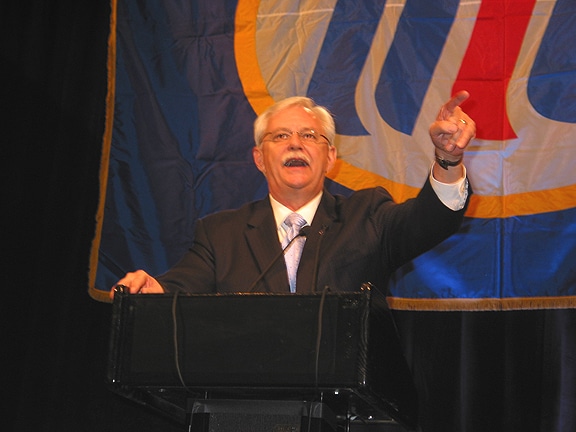
- International President Mike Futhey
SAN ANTONIO — Stronger protections for members, improved finances, successful organizing drives and superior wage and benefits agreements characterize the United Transportation Union in 2011, International President Mike Futhey told some 600 attendees in his state-of-the-union report at the first of two 2011 regional meetings here June 22.
“Before this administration took office Jan. 1, 2008, people said we couldn’t organize, couldn’t negotiate with carriers and couldn’t solve the union’s financial problems,” Futhey said. “We proved them wrong on each allegation. The UTU is stronger than ever.
“As this administration completes its fourth year in office,” said Futhey, “an average of one new air, bus, rail or transit property has been organized every seven weeks, two national rail agreements have been negotiated providing a combined 40 percent wage increase, the latest tentative agreement provides the highest increase in excess of the Consumer Price Index in the UTU’s 41-year history, and UTU and UTUIA finances have been improved dramatically.
“The UTU Collective Bargaining Defense Fund helped finance a petition drive in Ohio that put on hold – pending a November voter referendum — a bill to eliminate collective bargaining rights,” Futhey said. “In Wisconsin, UTU members were among the leaders of a successful petition drive forcing supporters of an anti-union bill to face recall elections in July and August. The Ohio and Wisconsin efforts forced political extremists in Indiana to shelve legislation to eliminate collective bargaining rights.
“UTU political activism has awakened and outraged voters in numerous states where political extremists are attacking middle-class values, including efforts to curtail their ability to vote through tougher registration procedures and fewer absentee voting days,” Futhey said. “We will do all we can to protect the integrity of the voting system.”
At the UTU International, said Futhey, automated billing and auditing, coupled with targeted cost cutting, reassignment of functions and upgrading of information technology allowed International funds to increase from $7.5 million to nearly $16 million. “There is no proposal for a dues increase at the upcoming quadrennial convention,” Futhey said.
The Discipline Income Protection Program reserve fund was turned from a $2 million loss in 2007 to a positive balance of more than $5 million today, “allowing sufficient funds to provide the protection UTU members expect and deserve,” Futhey said. “The UTU Insurance Association surplus has been made stronger and now stands at near $26 million.
“Our computer-based UTU University – a classroom without walls – is training officers to better serve their members at the negotiating table and in grievance handling,” Futhey said. “The awards data search engine has been improved, regional meeting workshops have been expanded to meet member requests, iLink provides better access to controlling awards and offers secure chat rooms for various levels of elected officers to exchange information and ideas.”
Among other achievements cited by Futhey:
- The redesigned UTU website includes a Membership Toolbox with answers to member concerns and questions; and allows a feedback to UTU officers. “Member questions and concerns will be answered,” Futhey said.
- A federally funded agreement was reached with Amtrak for the UTU to train employees to deal with unruly passengers; and another is being finalized with Terminal Railroad Association of St. Louis to train workers to recognize, respond to and report terrorist threats. Discussions are underway to expand these training programs to other carriers.
- Legislative activities succeeded in gaining conductor certification, minimum training standards, a requirement that an injured employee’s doctor — not the carrier — determine when to return to work, a prohibition against denying injured workers medical care or disciplining them for reporting injuries, and installation of positive train control.
- The UTU is working with friends in Congress to amend the Rail Safety Improvement Act to require a 10-hour call for all unassigned road service; allow regular yard jobs only eight hours off-duty between shifts; require yardmaster assignments be covered by hours-of-service provisions; require advance notice of interim release periods; and a limitation on limbo time to a maximum of two hours for each tour of duty.
- On behalf of our bus and transit members, the UTU is working to gain limitations on revocation of a commercial driver’s license for traffic violations when operating a personal automobile, a better appeals process for drivers taken out of service, limitations on civil actions against drivers, mandatory training for drivers, federal grants to assist with training of bus officers in negotiating skills, and greater flexibility to use transit capital grants for operating costs to preserve service and jobs.
- On behalf of airline members the UTU is working to preserve Essential Air Services grants and improve safety provisions for pilots and flight attendants.
- The UTU is working within the AFL-CIO to prevent privatization of Railroad Retirement, Social Security and Medicare. “Political extremists will not mess with your retirement,” Futhey said.
“This administration has delivered on its promises,” Futhey said. “Our record speaks for itself. We will never back up. We will never back down. We will always move forward.”
Related News
- Resolve to Keep Your Timebook Current in 2026
- Victory in Chicago as SMART-TD Helps Establish New $1.5 Billion Transit Agency
- New Jersey Train Length, Crew Size Law Awaits Governor’s Signature
- CSX Conductor, Single Mother Devastated in Head-on Collision
- SOFA Safety Alert
- AJFL Scholarship Application Opens Soon
- SMART-TD Applauds FRA and DOT for Strengthening Cross-Border Rail Safety Protections
- Regional Training Seminars coming to St. Paul, Baltimore in 2026
- Transit Funding Boost Proposed by SMART-TD Backed Bill
- California SMART-TD Brother Killed on the Job
